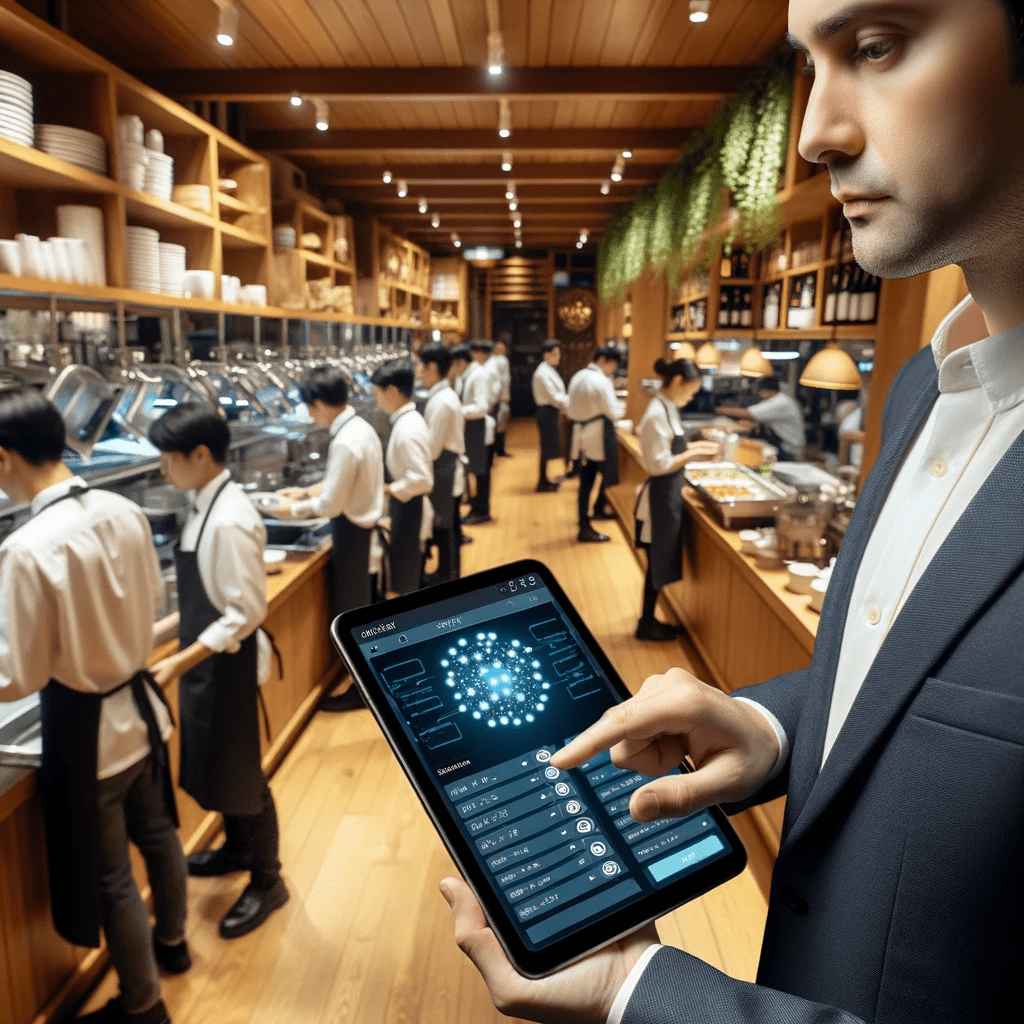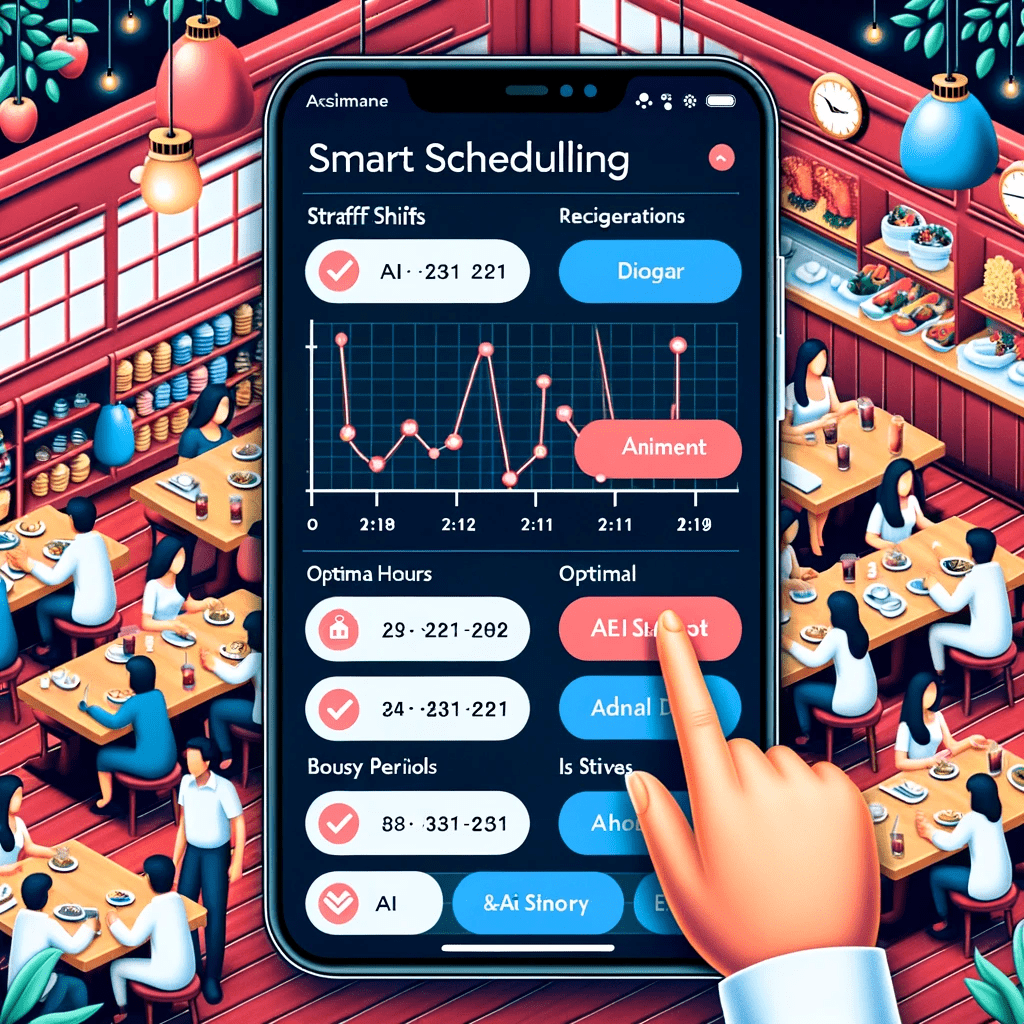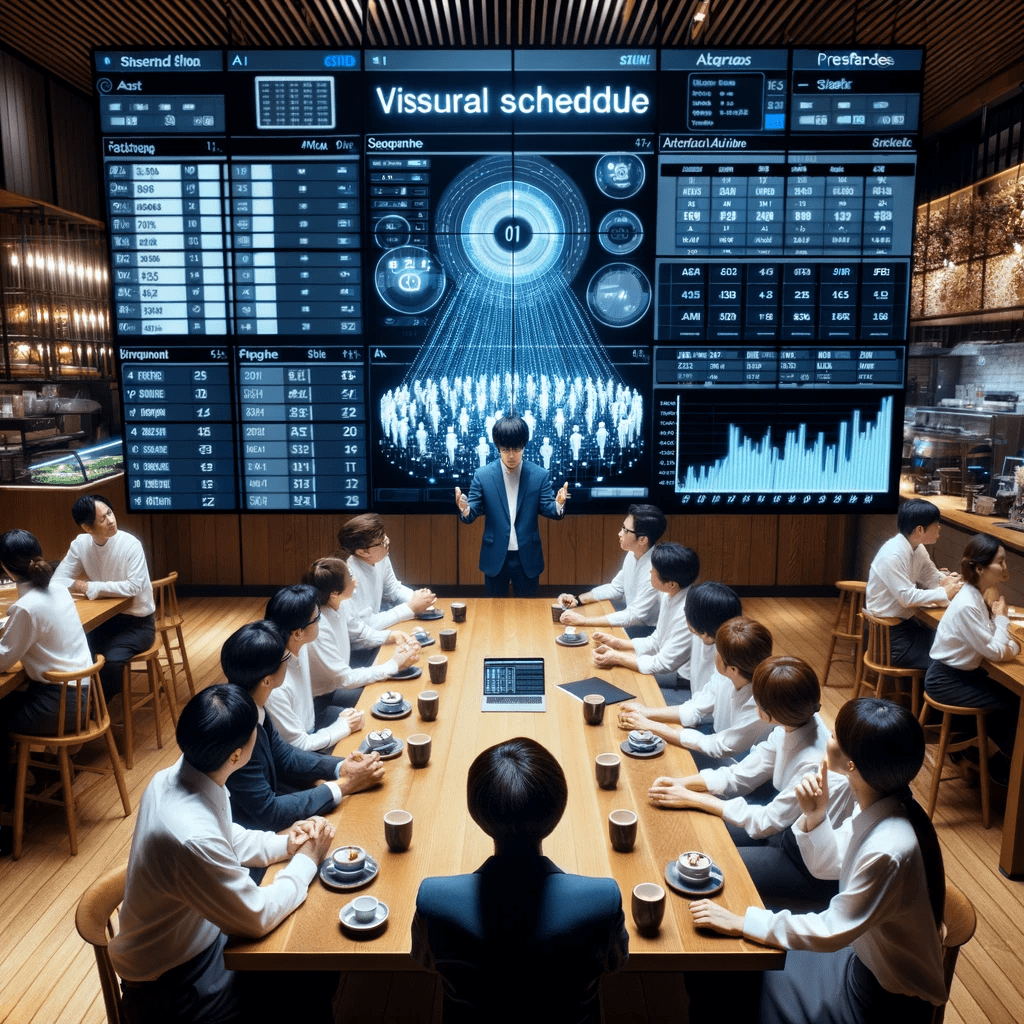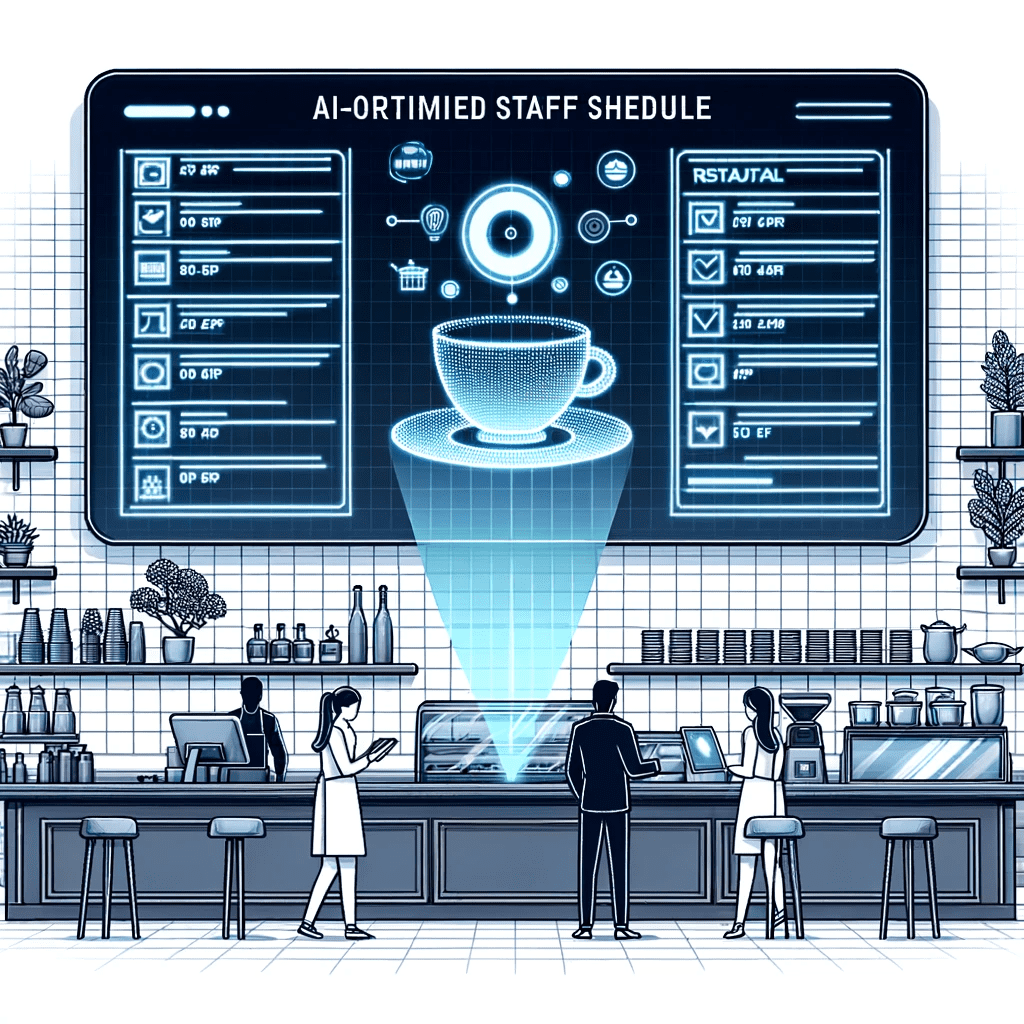The restaurant industry has been grappling with staffing shortages, which have resulted in closures and reduced hours. One of the major complaints from restaurant staff is the constant changes in their schedules, making it difficult to maintain a work-life balance and plan personal commitments. However, artificial intelligence (AI) has emerged as a potential solution for creating ideal staff schedules by utilizing historical data and complex rule sets. AI scheduling can accommodate different shift preferences, track minors' hours, and ultimately increase employee satisfaction while reducing turnover.
The implementation of AI in restaurant staff scheduling has the potential to revolutionize the industry. By leveraging AI algorithms, restaurants can optimize their scheduling practices, ensuring that their staffing needs are met while taking into account the preferences and availability of their employees. This not only improves operational efficiency but also enhances employee satisfaction and work-life balance.

The Role of AI in Restaurant Staff Scheduling
AI is transforming staff scheduling in restaurants by utilizing historical data and complex rule sets. These AI algorithms analyze previous scheduling patterns and consider various factors, such as employee availability and skill sets, to generate optimized schedules that fulfill the needs of the business and its employees. Moreover, AI scheduling systems can effectively track and manage minors' hours, ensuring compliance with labor laws. The benefits of AI scheduling include increased employee satisfaction, reduced turnover, and improved operational efficiency.
For example, let's consider a restaurant that experiences high demand during specific days or times of the week. With AI scheduling, the system can analyze historical data to identify these peak hours and automatically schedule more staff during those times. This ensures that the restaurant is adequately staffed to handle the influx of customers, reducing wait times and improving customer satisfaction. At the same time, the system can take into account employee preferences and availability to create a schedule that accommodates their needs, leading to higher job satisfaction.
In addition to optimizing scheduling, AI can also assist in other aspects of staff management, such as performance tracking and skill development. By analyzing data on employee performance and customer feedback, AI algorithms can provide valuable insights for identifying areas of improvement and offering targeted training opportunities. This helps in nurturing a skilled and motivated workforce, ultimately enhancing the overall dining experience for customers.
Availability Management and Open Shift Bidding
AI scheduling software offers availability management features that allow employees to input their preferred availability and swap shifts with their colleagues without involving a manager. This capability provides flexibility for employees and reduces the administrative burden on managers. Furthermore, open shift bidding is another feature that promotes fairness and flexibility in scheduling. Employees have the opportunity to bid on available shifts based on their preferences, qualifications, and availability, resulting in a more collaborative and employee-centric scheduling process.
For instance, imagine a restaurant where one employee wants to switch their shift with another employee for personal reasons. In a traditional scheduling system, this would require the involvement of a manager to approve the switch. However, with AI scheduling software, employees can easily request shift swaps and find suitable replacements among their colleagues. This empowers employees to have more control over their schedules and reduces the administrative burden on managers, allowing them to focus on other important tasks.
Moreover, AI scheduling software can also consider employee preferences when assigning shifts. For example, if an employee prefers to work in the morning rather than the evening, the AI algorithm can take this into account and assign shifts accordingly. This not only increases employee satisfaction but also improves overall scheduling efficiency by aligning shifts with employees' preferred work hours.
Custom Rules and Compliance
Custom rules play a crucial role in AI scheduling systems to ensure compliance with labor laws and accommodate specific requirements, such as school calendars for minors. By configuring the software with custom rules, managers can automate the scheduling process while adhering to legal regulations and internal policies. For example, the software can limit the number of hours scheduled for minors in accordance with legal restrictions. AI scheduling software, such as TCP's Humanity, offers customizable solutions to address the unique needs of different organizations.
Ensuring compliance with labor laws and regulations is of utmost importance in the restaurant industry. By incorporating custom rules into the AI scheduling software, restaurants can ensure that their scheduling practices align with legal requirements. This not only helps in avoiding legal issues and penalties but also promotes a fair and healthy work environment for employees. For instance, the software can automatically prevent scheduling employees for more than a certain number of consecutive shifts or ensure that employees are given the required rest periods between shifts, in accordance with labor laws.
Furthermore, custom rules can also take into account other factors that impact scheduling, such as employee preferences and availability. For example, the software can be configured to prioritize assigning shifts to employees who have requested specific time-off or prefer to work during certain hours. This level of customization helps in creating schedules that are not only compliant with labor laws but also considerate of employees' preferences and availability.

AI-powered Forecasting for Labor Scheduling and Inventory Management
AI-powered forecasting is an essential component of labor scheduling and inventory management in the restaurant industry. By analyzing historical sales data, guest counts, promotions, holidays, and other relevant factors, AI algorithms can provide valuable insights for optimizing labor scheduling and inventory levels. Fourth, a leader in workforce and inventory management solutions, offers an AI-powered forecasting solution that aims to optimize operations and improve profitability. With access to a vast repository of restaurant data, Fourth can predict customer demand and help businesses make informed decisions regarding staffing and inventory management.
AI-powered forecasting can greatly enhance the accuracy and efficiency of labor scheduling and inventory management in restaurants. By analyzing various factors and historical data, the AI algorithms can provide insights into customer demand patterns, allowing restaurants to schedule the right number of staff members at the right times. This not only helps in avoiding labor shortages or overstaffing but also ensures that customer service is optimized. Similarly, AI-powered forecasting can help restaurants manage their inventory levels more effectively, reducing waste and improving cost efficiency.
For example, imagine a restaurant that typically experiences a higher number of customers during lunchtime. AI-powered forecasting can analyze historical data, taking into account factors such as day of the week, weather conditions, and promotional events, to predict the expected customer demand during lunch hours. Based on these predictions, the restaurant can adjust its staff schedules to ensure that an adequate number of employees are available to provide efficient service during peak times. This not only helps in avoiding understaffing or overstaffing but also optimizes labor costs.
Additionally, AI-powered forecasting can assist in inventory management by predicting the demand for specific ingredients or menu items. By analyzing historical sales data and considering factors such as seasonal trends and promotional activities, AI algorithms can provide accurate forecasts for ingredient requirements. This information can help restaurants optimize their inventory levels, reducing waste and ensuring that they have sufficient supplies to meet customer demand.
Enhancing Restaurant Operations with AI
AI has the potential to enhance various aspects of restaurant operations. By automating inventory tracking, predicting demand, and generating purchase orders, AI can streamline the supply chain and improve efficiency. AI can also automate recipe scaling, monitor food temperatures, and ensure consistent quality in food preparation, reducing the risk of errors and enhancing customer satisfaction. Furthermore, AI can optimize staff schedules based on historical data and customer demand, minimizing labor costs while ensuring adequate staffing levels. Additionally, AI assistants can support staff by providing reminders and answering questions, improving communication and productivity.
One of the significant advantages of AI in restaurant operations is its ability to automate inventory management processes. By tracking inventory levels in real-time and analyzing historical data, AI algorithms can provide accurate forecasts for ingredient requirements. This enables restaurants to optimize their inventory levels, reducing waste and avoiding shortages or overstocking. Automated inventory tracking also helps in streamlining the supply chain by generating timely purchase orders for replenishing ingredients, thereby improving efficiency and reducing the risk of stockouts.
Moreover, AI can play a crucial role in ensuring consistent quality in food preparation. By monitoring food temperatures, AI algorithms can identify any deviations from the desired range and alert staff to take corrective actions. This helps in preventing the serving of undercooked or overcooked food, ensuring that customers receive meals of consistent quality. Additionally, AI can automate recipe scaling, allowing restaurants to adjust the quantities of ingredients accurately based on the number of servings required. This minimizes the risk of errors in ingredient measurements and ensures consistent portion sizes.
Another area where AI can significantly impact restaurant operations is staff scheduling. By analyzing historical data on customer demand and sales patterns, AI algorithms can generate optimized staff schedules that align with business needs. This helps in minimizing labor costs by ensuring that the right number of employees are scheduled at the right times. Additionally, AI algorithms can consider factors such as employee preferences and availability, creating schedules that are more likely to meet the needs and preferences of the staff. This not only improves employee satisfaction but also reduces turnover rates, as employees feel valued and have greater control over their work schedules.
Furthermore, the use of AI assistants can provide valuable support to restaurant staff. AI assistants can be programmed to provide reminders for tasks and appointments, ensuring that employees stay organized and meet their responsibilities. They can also answer common questions, such as inquiries about menu items or restaurant policies, reducing the need for staff to interrupt their tasks to address customer queries. This improves overall communication and productivity within the restaurant, allowing staff to focus on delivering exceptional service to customers.
Supporting Staff with AI Assistants
AI assistants have the capability to support restaurant staff in various ways. They can provide timely reminders for tasks and appointments, helping employees stay organized and on track. AI assistants can also analyze customer feedback to identify areas for improvement and predict equipment maintenance needs to avoid unexpected breakdowns. Moreover, AI assistants can handle customer inquiries, freeing up staff to focus on providing personalized service and enhancing the dining experience.
AI assistants can be a valuable tool in supporting restaurant staff and improving their efficiency. For example, AI assistants can send reminders to staff members for tasks and appointments, ensuring that important deadlines are not missed. This helps in avoiding any confusion or oversight, ultimately enhancing productivity and reducing errors. AI assistants can also analyze customer feedback, such as online reviews or survey responses, to identify areas where improvements can be made. By aggregating and analyzing this data, AI algorithms can provide valuable insights to managers, enabling them to take targeted actions to enhance customer satisfaction.
Furthermore, AI assistants can predict equipment maintenance needs by analyzing data on equipment usage and performance. By monitoring various parameters, such as energy consumption or system errors, AI algorithms can identify potential issues before they escalate into equipment failures. This proactive approach helps in avoiding unexpected breakdowns, reducing downtime, and ensuring smooth operations within the restaurant.
Additionally, AI assistants can handle customer inquiries, freeing up staff members to focus on providing personalized service. For instance, AI-powered chatbots can be integrated into a restaurant's website or mobile app to answer frequently asked questions, such as hours of operation, reservation availability, or dietary restrictions. This not only improves customer satisfaction by providing instant responses but also allows staff members to dedicate more time and attention to customers present in the restaurant.

Benefits and Applications of AI in Employee Scheduling and Workforce Management
AI has significantly impacted businesses in various industries, including hospitality, restaurants, and care homes. Its benefits in employee scheduling and workforce management are numerous, ranging from automation and improved efficiency to reduced labor costs. AI can optimize time tracking, leave management, and employee engagement, leading to increased productivity and job satisfaction. However, there are challenges to consider, such as implementation and integration issues, data privacy concerns, potential bias, and the risk of over-reliance on technology. Despite these challenges, the future of AI in employee scheduling and workforce management holds great promise for improved operations and better compliance.
The benefits of AI in employee scheduling and workforce management are significant and can have a profound impact on the success of a restaurant. By automating various tasks and processes, AI can save time and reduce the administrative burden on managers. For instance, AI algorithms can automate time tracking, eliminating the need for manual entry and reducing errors. Leave management can also be streamlined with AI, allowing employees to request time off and managers to approve or deny these requests with ease.
Moreover, AI can analyze data to identify patterns and trends in employee engagement, helping businesses make data-driven decisions to improve productivity and job satisfaction. For example, AI algorithms can analyze employee feedback surveys or sentiment analysis of communication channels to assess the overall employee experience and identify areas for improvement. This information can then be used to implement targeted initiatives, such as training programs or recognition schemes, to enhance employee engagement and job satisfaction.
However, it is important to address the challenges associated with the implementation of AI in employee scheduling and workforce management. One such challenge is ensuring the proper integration of AI systems with existing processes and technologies. This requires careful planning and coordination to ensure a smooth transition and avoid disruptions to daily operations. Data privacy and security concerns are also critical, as AI systems rely on access to employee data. It is essential to implement robust security measures to protect employee information and comply with data protection regulations.
Furthermore, the potential for bias in AI algorithms is a concern that needs to be addressed. AI systems are only as good as the data they are trained on, and if the data used to train the algorithms is biased, it can result in biased decision-making. It is crucial to ensure that the data used to train AI algorithms is diverse and representative of the entire workforce. Regular monitoring and evaluation of AI systems can help identify and address any biases that may arise.
Lastly, while AI can greatly enhance scheduling and workforce management processes, it is important to strike a balance and avoid over-reliance on technology. Human judgment and decision-making are still invaluable in managing a workforce effectively. AI should be seen as a tool to support decision-making, rather than a replacement for human managers. By leveraging the capabilities of AI alongside human expertise, restaurants can achieve the best outcomes in employee scheduling and workforce management.
Best Practices and Considerations for Restaurant Staff Scheduling
Implementing fair and transparent scheduling practices is essential for maintaining a positive work environment. This includes ensuring fair overtime pay and breaks, as well as providing time off in a considerate manner that takes into account employees' future needs and preferences. Scheduling holidays accordingly and paying employees time and a half for working on holidays is also important. Different scheduling options, such as fixed shifts, open shifts, and on-call shifts, have their own benefits and considerations that should be taken into account. Balancing skill sets per shift and offering side work and cross-training opportunities can enhance employee satisfaction and provide backup options. Effective communication with the team and optimizing labor spending based on sales and service trends are crucial for successful staff scheduling.
Adopting best practices in restaurant staff scheduling is key to ensuring a positive work environment and promoting employee satisfaction. This includes treating employees fairly by providing fair overtime pay and breaks, as well as considering their future needs and preferences when scheduling time off. Scheduling holidays accordingly and paying employees time and a half for working on holidays is also important for maintaining employee morale. Different scheduling options, such as fixed shifts, open shifts, and on-call shifts, have their own advantages and considerations, and businesses should choose the option that best suits their needs. Balancing skill sets per shift and offering side work and cross-training opportunities can enhance employee satisfaction and provide backup options in case of emergencies. Effective communication with the team is crucial for successful staff scheduling, as it helps in addressing any scheduling concerns or conflicts. Additionally, optimizing labor spending based on sales and service trends can help businesses maximize their profitability while ensuring adequate staffing levels.
Considering the preferences and availability of employees when creating schedules is also important. By involving employees in the scheduling process and taking their preferences into account, businesses can create a more engaged and satisfied workforce. This can be facilitated through the use of AI scheduling software, which allows employees to input their preferred availability and swap shifts with their colleagues. By providing employees with the flexibility to manage their own schedules, businesses can foster a greater sense of autonomy and work-life balance.
Choosing the Right Scheduling Software
Switching to restaurant scheduling software can streamline the scheduling process and improve efficiency. There are various scheduling software options available, each with its own features and capabilities. When choosing software, it's important to consider specific scheduling needs and regulations, such as labor laws and payroll requirements, to ensure compliance and maximize the benefits of the software.
Choosing the right scheduling software is crucial for the successful implementation of AI in restaurant staff scheduling. There are numerous software options available, each offering different features and capabilities. When selecting software, businesses should consider their specific scheduling needs and regulations, such as labor laws and payroll requirements. It is important to choose a software solution that is flexible and customizable to accommodate the unique requirements of the restaurant. Additionally, the software should have robust reporting and analytics capabilities to provide valuable insights into scheduling patterns and employee performance.
Moreover, the integration capabilities of the scheduling software should also be considered. The software should be able to seamlessly integrate with other systems, such as payroll and time tracking software, to ensure accurate and efficient data management. This integration eliminates the need for manual data entry and reduces the risk of errors or discrepancies.
Furthermore, usability and user experience should be taken into account when selecting scheduling software. The software should have an intuitive interface that is easy to navigate and use. It should also provide clear and concise communication channels, allowing managers and employees to easily communicate about scheduling changes or requests.
Lastly, it is important to consider the scalability of the scheduling software. As the restaurant grows and expands, the software should be able to accommodate the increasing number of employees and scheduling complexities. Choosing a scalable software solution ensures that the scheduling process remains efficient and effective, even as the business evolves.

Conclusion
AI has the potential to revolutionize restaurant staff scheduling and workforce management, offering benefits such as increased efficiency, reduced labor costs, and improved employee satisfaction. By leveraging historical data, complex rule sets, and AI-powered forecasting, businesses can optimize their operations and deliver exceptional dining experiences. It is crucial for restaurants to embrace AI solutions and adopt best practices to gain a competitive edge in today's dynamic industry. With the right AI-powered tools and strategies in place, restaurants can overcome staffing challenges, improve scheduling practices, and create a positive work environment for their staff. Ultimately, AI empowers restaurants to optimize their staff schedules, resulting in improved operational efficiency and enhanced customer satisfaction.